连词及其考点
- 格式:doc
- 大小:64.00 KB
- 文档页数:6
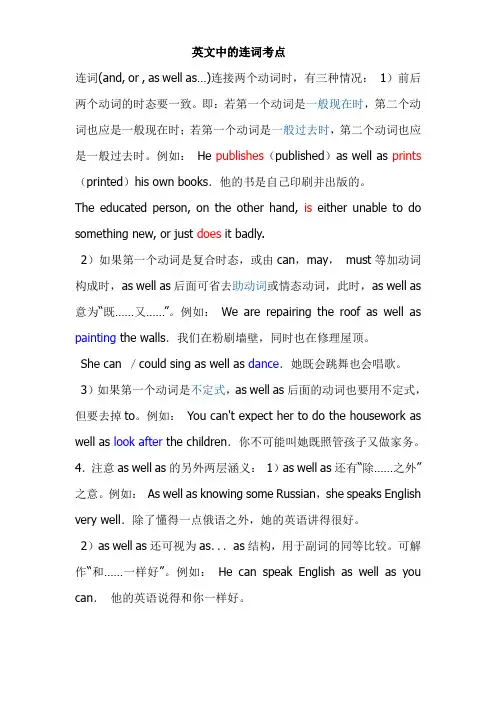
英文中的连词考点连词(and, or , as well as…)连接两个动词时,有三种情况:1)前后两个动词的时态要一致。
即:若第一个动词是一般现在时,第二个动词也应是一般现在时;若第一个动词是一般过去时,第二个动词也应是一般过去时。
例如:He publishes(published)as well as prints (printed)his own books.他的书是自己印刷并出版的。
The educated person, on the other hand,is either unable to do something new, or just does it badly.2)如果第一个动词是复合时态,或由can,may,must等加动词构成时,as well as后面可省去助动词或情态动词,此时,as well as 意为“既……又……”。
例如:We are repairing the roof as well as painting the walls.我们在粉刷墙壁,同时也在修理屋顶。
She can /could sing as well as dance.她既会跳舞也会唱歌。
3)如果第一个动词是不定式,as well as后面的动词也要用不定式,但要去掉to。
例如:You can't expect her to do the housework as well as look after the children.你不可能叫她既照管孩子又做家务。
4.注意as well as的另外两层涵义:1)as well as还有“除……之外”之意。
例如:As well as knowing some Russian,she speaks English very well.除了懂得一点俄语之外,她的英语讲得很好。
2)as well as还可视为as...as结构,用于副词的同等比较。
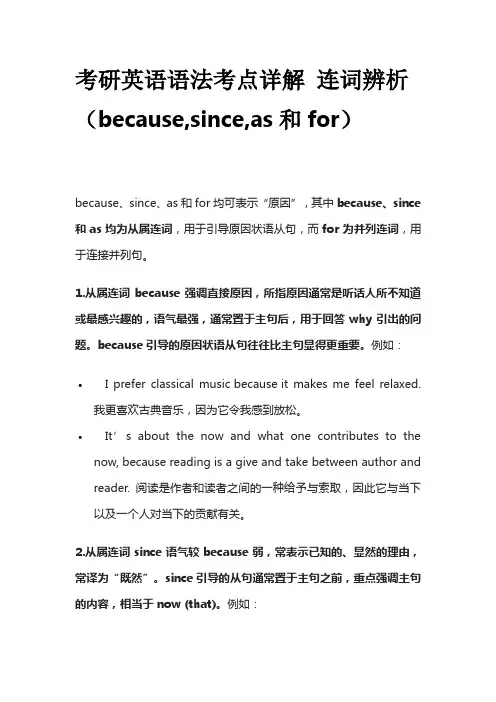
考研英语语法考点详解连词辨析(because,since,as和for)because、since、as和for均可表示“原因”,其中because、since 和as均为从属连词,用于引导原因状语从句,而for为并列连词,用于连接并列句。
1.从属连词because强调直接原因,所指原因通常是听话人所不知道或最感兴趣的,语气最强,通常置于主句后,用于回答why引出的问题。
because引导的原因状语从句往往比主句显得更重要。
例如:•I prefer classical music because it makes me feel relaxed.我更喜欢古典音乐,因为它令我感到放松。
•It’s about the now and what one contributes to the now, because reading is a give and take between author and reader. 阅读是作者和读者之间的一种给予与索取,因此它与当下以及一个人对当下的贡献有关。
2.从属连词since语气较because弱,常表示已知的、显然的理由,常译为“既然”。
since引导的从句通常置于主句之前,重点强调主句的内容,相当于now (that)。
例如:•Since you have repaired my TV set, there is no need for me to buy a new one. 既然你把我的电视机修好了,我就没有必要买新的了。
•We thought that, since we were in the area, we’d stop by and see them. 我们想,既然到了这个地方,就该顺便去看看他们。
3.从属连词as引导原因状语从句时,表示双方已知的事实或显而易见的原因,用法与since大致相同,但语气更弱,没有since正式。
例如:•I don’t enjoy watching TV with my brother as he always switches over to the programs that he wants to watch. 我不喜欢和我弟弟一起看电视,因为他总是切换到他想看的节目。
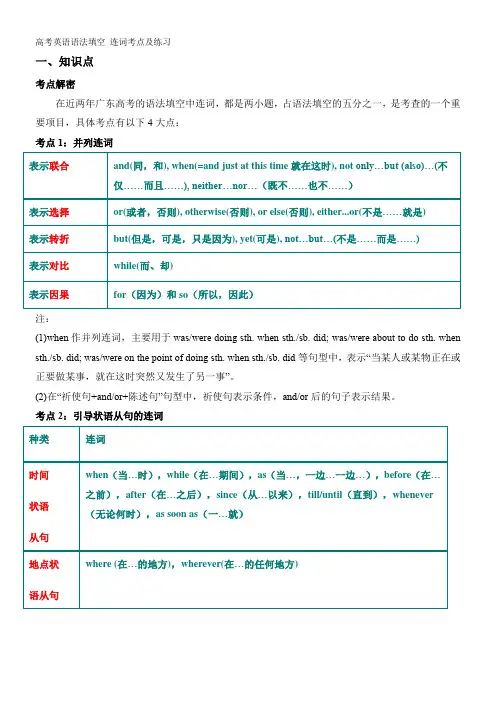
高考英语语法填空连词考点及练习一、知识点考点解密在近两年广东高考的语法填空中连词,都是两小题,占语法填空的五分之一,是考查的一个重要项目,具体考点有以下4大点:考点1:并列连词注:(1)when作并列连词,主要用于was/were doing sth. when sth./sb. did; was/were about to do sth. when sth./sb. did; was/were on the point of doing sth. when sth./sb. did等句型中,表示“当某人或某物正在或正要做某事,就在这时突然又发生了另一事”。
(2)在“祈使句+and/or+陈述句”句型中,祈使句表示条件,and/or后的句子表示结果。
考点2:引导状语从句的连词考点3:引导名词性从句的连接词名词性从句有主语从句、表语从句、宾语从句和同位语从句。
引导这些从句的连词有:(1)连词that:只起连接作用,没有任何意思,不作任何句子成分,在宾语从句中可省略。
(2)连词whether:有“是否”之意,但不作句子成分;引导宾语从句时,还可用if。
(3)连接代词:who(m), whose, which, what等均有各自的意义,在从句中作主语、宾语、定语等。
其中what除有“什么”“多么”外,还有“所……的”之意,相当于the thing(s) that…。
(4)连接副词:when, where, why, how等,有意义,在从句中作状语。
(5)whoever, whatever, whichever等也可引导名词性从句,意为“无论/不管……”。
考点4:引导定语从句的关系词定语从句就是在复合句里充当定语的从句,它通常紧靠在所修饰的名词或代词后面。
引导定语从句的关系代词和关系副词及使用场合如下表:注:(1)先行词是occasion常用when,先行词是case, situation, scenes等时常用where。
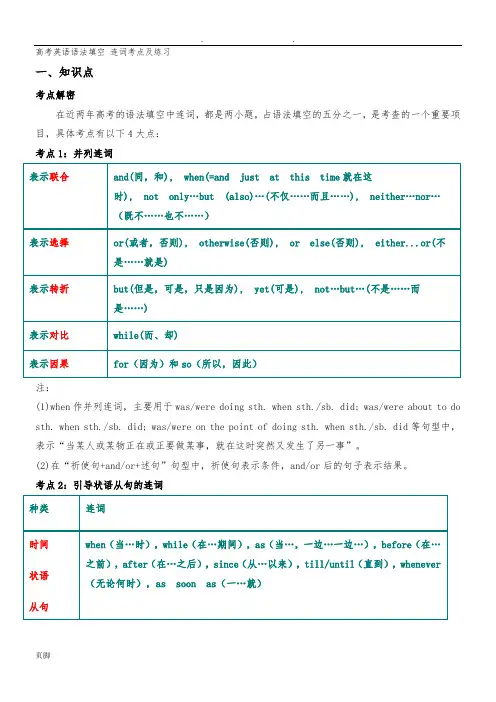
高考英语语法填空连词考点及练习一、知识点考点解密在近两年高考的语法填空中连词,都是两小题,占语法填空的五分之一,是考查的一个重要项目,具体考点有以下4大点:考点1:并列连词注:(1)when作并列连词,主要用于was/were doing sth. when sth./sb. did; was/were about to do sth. when sth./sb. did; was/were on the point of doing sth. when sth./sb. did等句型中,表示“当某人或某物正在或正要做某事,就在这时突然又发生了另一事”。
(2)在“祈使句+and/or+述句”句型中,祈使句表示条件,and/or后的句子表示结果。
考点2:引导状语从句的连词考点3:引导名词性从句的连接词名词性从句有主语从句、表语从句、宾语从句和同位语从句。
引导这些从句的连词有:(1)连词that:只起连接作用,没有任何意思,不作任何句子成分,在宾语从句中可省略。
(2)连词whether:有“是否”之意,但不作句子成分;引导宾语从句时,还可用if。
(3)连接代词:who(m), whose, which, what等均有各自的意义,在从句中作主语、宾语、定语等。
其中what除有“什么”“多么”外,还有“所……的”之意,相当于the thing(s) that…。
(4)连接副词:when, where, why, how等,有意义,在从句中作状语。
(5)whoever, whatever, whichever等也可引导名词性从句,意为“无论/不管……”。
考点4:引导定语从句的关系词定语从句就是在复合句里充当定语的从句,它通常紧靠在所修饰的名词或代词后面。
引导定语从句的关系代词和关系副词及使用场合如下表:注:(1)先行词是occasion常用when,先行词是case, situation, scenes等时常用where。
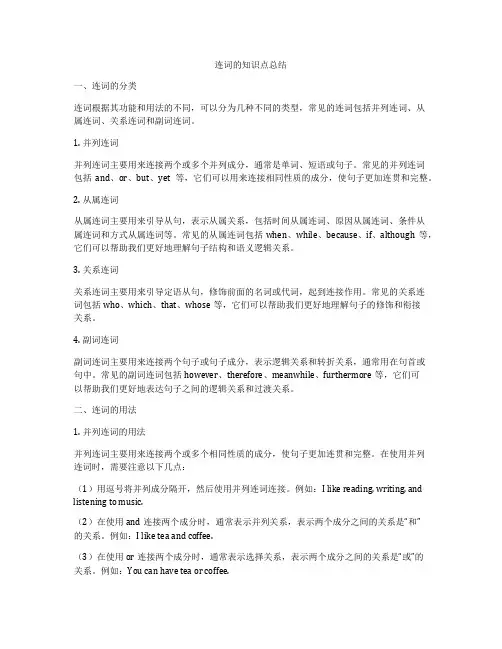
连词的知识点总结一、连词的分类连词根据其功能和用法的不同,可以分为几种不同的类型,常见的连词包括并列连词、从属连词、关系连词和副词连词。
1. 并列连词并列连词主要用来连接两个或多个并列成分,通常是单词、短语或句子。
常见的并列连词包括and、or、but、yet等,它们可以用来连接相同性质的成分,使句子更加连贯和完整。
2. 从属连词从属连词主要用来引导从句,表示从属关系,包括时间从属连词、原因从属连词、条件从属连词和方式从属连词等。
常见的从属连词包括when、while、because、if、although等,它们可以帮助我们更好地理解句子结构和语义逻辑关系。
3. 关系连词关系连词主要用来引导定语从句,修饰前面的名词或代词,起到连接作用。
常见的关系连词包括who、which、that、whose等,它们可以帮助我们更好地理解句子的修饰和衔接关系。
4. 副词连词副词连词主要用来连接两个句子或句子成分,表示逻辑关系和转折关系,通常用在句首或句中。
常见的副词连词包括however、therefore、meanwhile、furthermore等,它们可以帮助我们更好地表达句子之间的逻辑关系和过渡关系。
二、连词的用法1. 并列连词的用法并列连词主要用来连接两个或多个相同性质的成分,使句子更加连贯和完整。
在使用并列连词时,需要注意以下几点:(1)用逗号将并列成分隔开,然后使用并列连词连接。
例如:I like reading, writing, and listening to music.(2)在使用and连接两个成分时,通常表示并列关系,表示两个成分之间的关系是“和”的关系。
例如:I like tea and coffee.(3)在使用or连接两个成分时,通常表示选择关系,表示两个成分之间的关系是“或”的关系。
例如:You can have tea or coffee.(4)在使用but连接两个成分时,通常表示转折关系,表示两个成分之间的关系是“但是”的关系。
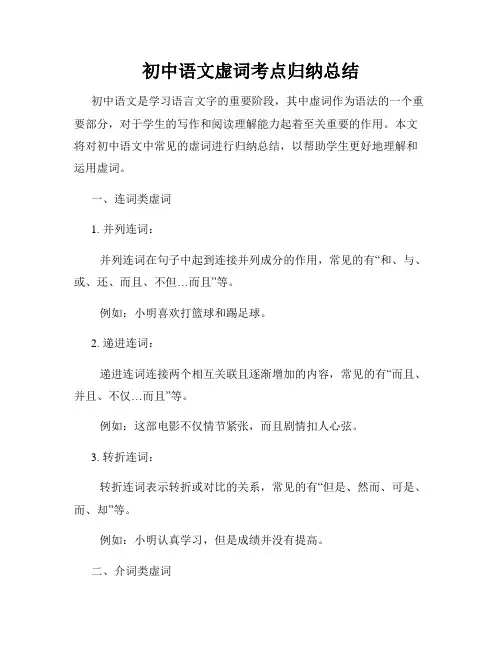
初中语文虚词考点归纳总结初中语文是学习语言文字的重要阶段,其中虚词作为语法的一个重要部分,对于学生的写作和阅读理解能力起着至关重要的作用。
本文将对初中语文中常见的虚词进行归纳总结,以帮助学生更好地理解和运用虚词。
一、连词类虚词1. 并列连词:并列连词在句子中起到连接并列成分的作用,常见的有“和、与、或、还、而且、不但…而且”等。
例如:小明喜欢打篮球和踢足球。
2. 递进连词:递进连词连接两个相互关联且逐渐增加的内容,常见的有“而且、并且、不仅…而且”等。
例如:这部电影不仅情节紧张,而且剧情扣人心弦。
3. 转折连词:转折连词表示转折或对比的关系,常见的有“但是、然而、可是、而、却”等。
例如:小明认真学习,但是成绩并没有提高。
二、介词类虚词1. 方位介词:方位介词用来表示空间、方向关系,常见的有“在、向、从、到、往、离”等。
例如:小红拿起书走到桌子前。
2. 时间介词:时间介词用来表示时间关系,常见的有“在、于、向、自、以、至”等。
例如:我每天早上都在七点起床。
3. 所有格介词:所有格介词表示所有关系,常见的有“的、之、的”等。
例如:这是我的书。
三、助词类虚词1. 助动词:助动词用来帮助说明动词的时态、语态等方面的信息,常见的有“是、有、要、能、会”等。
例如:我是一名学生。
2. 状态助词:状态助词用来表示程度、态度等,常见的有“很、非常、太、极其、确实”等。
例如:这本书很有趣。
四、语气助词类虚词1. 接续助词:接续助词用来连接句子并起到过渡作用,常见的有“的、地、得”等。
例如:他高兴地笑了起来。
2. 着助词:着助词表示动作的状态或方式,常见的有“在、向、跟、对、向、给”等。
例如:他朝我走来。
五、语气助词类虚词1. 疑问代词:疑问代词用来引导疑问句,常见的有“谁、哪、什么、哪里”等。
例如:你是谁?2. 疑问副词:疑问副词用来引导疑问句,并对地点、时间、方式等进行疑问,常见的有“怎么、为什么、哪里”等。
例如:你为什么哭了?六、感叹代词类虚词1. 感叹代词:感叹代词用来表示情绪或强调一种感叹的语气,常见的有“多么、何等”等。
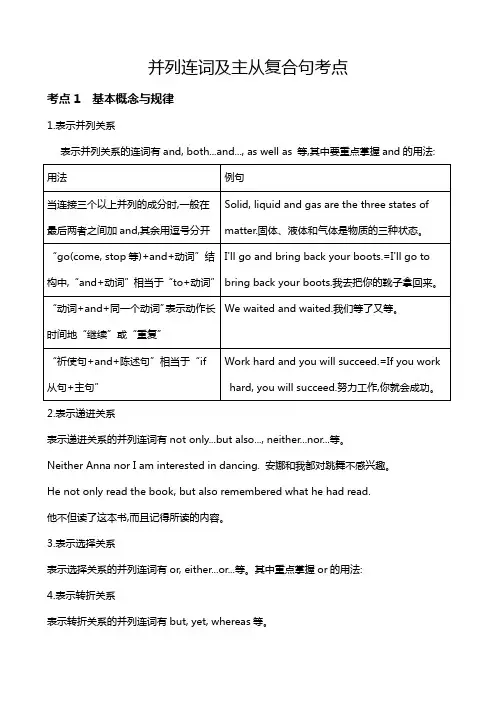
并列连词及主从复合句考点考点1 基本概念与规律1.表示并列关系表示并列关系的连词有and, both...and..., as well as 等,其中要重点掌握and的用法:2.表示递进关系表示递进关系的并列连词有not only...but also..., neither...nor...等。
Neither Anna nor I am interested in dancing. 安娜和我都对跳舞不感兴趣。
He not only read the book, but also remembered what he had read.他不但读了这本书,而且记得所读的内容。
3.表示选择关系表示选择关系的并列连词有or, either...or...等。
其中重点掌握or的用法:4.表示转折关系表示转折关系的并列连词有but, yet, whereas等。
Jane said she was ill,yet I saw her in the street just now.简说她生病了,但刚才我在街上看到了她。
Some of the studies show positive results,whereas others do not.有一些研究结果令人满意,然而其他的则不然。
此外,but还可用于“I'm sorry but...”,“Excuse me, but...”句型中。
I am sorry but I won't be able to come tonight.对不起我今晚不能来。
注意although/though不能与but连用,但可以和yet连用。
Although I live alone, yet I am very happy.=I live alone, but I am very happy.我虽然一个人生活,但很愉快。
5.表示对比关系表示对比关系的并列连词有while。
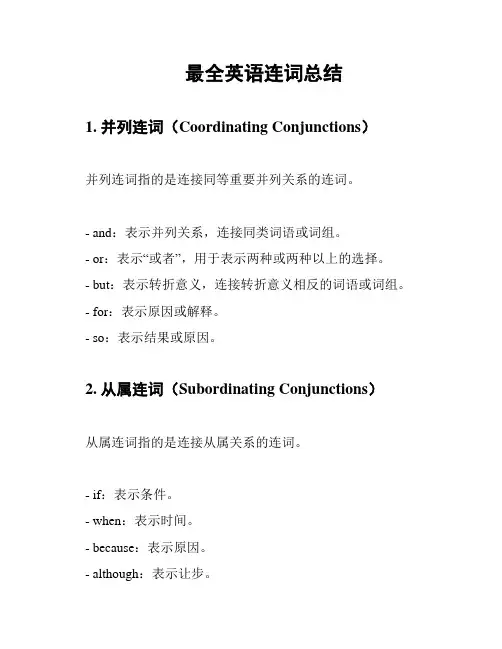
最全英语连词总结1. 并列连词(Coordinating Conjunctions)并列连词指的是连接同等重要并列关系的连词。
- and:表示并列关系,连接同类词语或词组。
- or:表示“或者”,用于表示两种或两种以上的选择。
- but:表示转折意义,连接转折意义相反的词语或词组。
- for:表示原因或解释。
- so:表示结果或原因。
2. 从属连词(Subordinating Conjunctions)从属连词指的是连接从属关系的连词。
- if:表示条件。
- when:表示时间。
- because:表示原因。
- although:表示让步。
- unless:表示否定条件。
- while:表示同时发生的两个动作。
3. 连接副词(Conjunctive Adverbs)连接副词用于连接句子,但是它们并不像从属连词那样改变句子的语气。
- however:表示转折。
- moreover:表示补充。
- nevertheless:表示转折。
- consequently:表示结果。
- meanwhile:表示同时发生的动作。
- therefore:表示结果。
4. 独立主格结构连接词(Linking Words for Independent Clauses)独立主格结构连接词是为了使得两个独立子句之间的意义更加流畅。
- therefore:表示结果。
- indeed:表示转折。
- besides:表示补充。
- however:表示转折。
- thus:表示结果。
5. 转折连词(Correlative Conjunctions)转折连词是一组连词,用于引导前后两个相反的词语或词组。
- neither...nor:表示两个事物都不是。
- not only...but also:表示不仅这样,而且还有那样。
- either...or:表示“或者”。
以上就是英语连词的分类和用法了,希望对大家有所帮助。
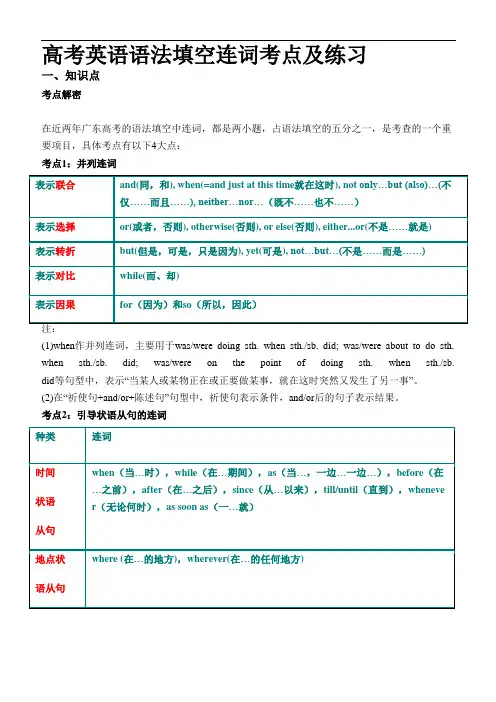
高考英语语法填空连词考点及练习一、知识点考点解密在近两年广东高考的语法填空中连词,都是两小题,占语法填空的五分之一,是考查的一个重要项目,具体考点有以下4大点:考点1:并列连词(1)when作并列连词,主要用于was/were doing sth. when sth./sb. did; was/were about to do sth. when sth./sb. did; was/were on the point of doing sth. when sth./sb. did等句型中,表示“当某人或某物正在或正要做某事,就在这时突然又发生了另一事”。
(2)在“祈使句+and/or+陈述句”句型中,祈使句表示条件,and/or后的句子表示结果。
考点2:引导状语从句的连词名词性从句有主语从句、表语从句、宾语从句和同位语从句。
引导这些从句的连词有:(1)连词that:只起连接作用,没有任何意思,不作任何句子成分,在宾语从句中可省略。
(2)连词whether:有“是否”之意,但不作句子成分;引导宾语从句时,还可用if。
(3)连接代词:who(m), whose, which, what等均有各自的意义,在从句中作主语、宾语、定语等。
其中what除有“什么”“多么”外,还有“所……的”之意,相当于the thing(s) that…。
(4)连接副词:when, where, why, how等,有意义,在从句中作状语。
(5)whoever, whatever, whichever等也可引导名词性从句,意为“无论/不管……”。
考点4:引导定语从句的关系词定语从句就是在复合句里充当定语的从句,它通常紧靠在所修饰的名词或代词后面。
引导定语从句的关系代词和关系副词及使用场合如下表:(1)先行词是occasion常用when,先行词是case, situation, scenes等时常用where。
(2)关系副词when和where有时可用“介词+which”代替,why可用for which代替。
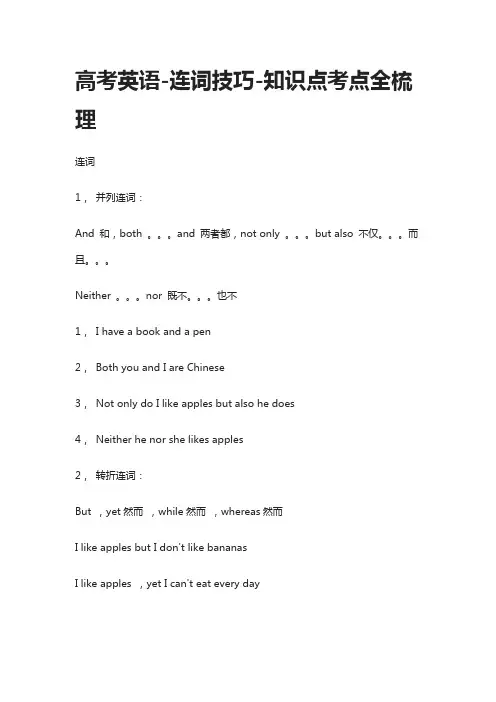
高考英语-连词技巧-知识点考点全梳理连词1,并列连词:And 和,both 。
and 两者都,not only 。
but also 不仅。
而且。
Neither 。
nor 既不。
也不1,I have a book and a pen2,Both you and I are Chinese3,Not only do I like apples but also he does4,Neither he nor she likes apples2,转折连词:But ,yet然而,while然而,whereas然而I like apples but I don't like bananasI like apples ,yet I can't eat every dayThe weather in Shanghai is so hot while/whereas that of Guiyang is so cool3,选择连词:or ,either。
or,not。
but 不是。
而是Do you like apples or bananas ?你喜欢苹果还是香蕉?Either you or I am in Beijing 或者你,或者我在北京I don't like fruit but apples 我除了苹果,我不喜欢其他的水果4,从属连词1,名词性从句:that,if,whetherThat all men can speak English here makes me surprised=It makes me surprised that all men can speak English这里所有的人都可以说英语让我很吃惊I am not sure if you are here 我不确定你是否在这里The question is whether you can give it to me 问题就是,你是否能把它给我2,状语从句时间状语:when,while ,as ,after,before,until,since,as soon as 等After you finish your homework,wash your clothes 在完成你的作业之后,清洗你的衣服3,原因状语:because ,since,as,now that ,等I have no time to your party because I have too much homework 我没有时间去你的聚会,因为我有太多的作业。
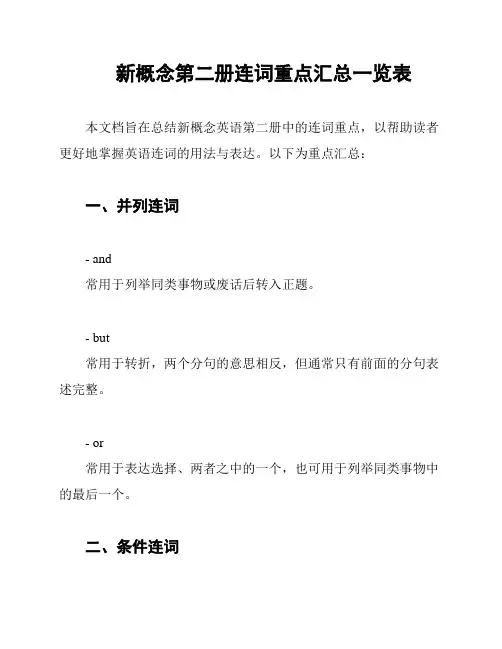
新概念第二册连词重点汇总一览表
本文档旨在总结新概念英语第二册中的连词重点,以帮助读者更好地掌握英语连词的用法与表达。
以下为重点汇总:
一、并列连词
- and
常用于列举同类事物或废话后转入正题。
- but
常用于转折,两个分句的意思相反,但通常只有前面的分句表述完整。
- or
常用于表达选择、两者之中的一个,也可用于列举同类事物中的最后一个。
二、条件连词
- if
常用于表示条件、假设、可能性等,引导条件从句。
- unless
表示否定条件,通常与否定词连用。
- so long as/as long as
意为“只要”,引导条件从句。
三、让步连词
- though/although
表示让步,引导让步状语从句。
- while/whilst
表示对比,引导对比状语从句。
四、时间连词
- when
表示时间状语从句,通常与一般过去时或过去进行时连用。
- until/till
表示某个时间之前,引导时间状语从句。
五、原因连词
- because/since/as
表示原因,引导原因状语从句。
- for
也可表示原因,但通常放在句首或句中,不引导从句。
本文仅为常用连词的简要总结,更多细节请参见第二册教材。
希望本文能对读者在英语学习中有所帮助。
连词知识点总结和考点连词知识点总结和考点连词是一种连接词与词,短语与短语以及句与句的虚词,它不能独立担任句子成分而只起连接作用。
连词主要可分为两类:并列连词和从属连词。
一、并列连词用来连接平行的词、词组和分句。
并列连词连接的双方是对等的。
常有的并列连词有and,both…and(两者都),neither…nor(既不……也不……),notonly…butalso(不但…而且),aswellas等。
但如果连接的两部分意义不趋向一致,意义有转折的并列连词有:but (但是),however(然而),while(而),only(只不过)。
还有表示选择关系的并列连词,如:or,either…or(或者…或者…),再有的是连接双方,互为因果,或表示前因后果的`连词有:for(因为),so(所以),therefore(因此)等。
例句:Sheplaysnotonlythepiano,but(also)theguitar.二、从属连词,在初中范围内常常考查引导状语从句、宾语从句的从属连词。
其中有时间状语从句,常用的连接词有:when,while,as,since,before,after,once,assoonas,until,till连接条件状语的连词有:if,unless,aslongas等,而原因状语的连接词有because,since,as,nowthat(既然)。
目的、结果、方式、比较、地点等状语从句的连接词有:sothat,so…that,such…that,as…as,than,where…它们在句子与文章中几乎无处不见。
用来连接宾语从句,如:that,if,whether。
例句如下:TomwillcallmeassoonashegetstoShanghai.Themeetingdidn'tstartuntileveryonewasthere.Iwanttoknowifsheisgoingtoseeafilm.常见考法对于连词,主要以单项选择或完形填空的形式从意义和功能(重点是意义)角度考查学生灵活运用连词的能力。
高考英语语法填空连词考点及练习1. 连词考点:and练习题:The sun was shining _____ the birds were singing.答案:and2. 连词考点:but练习题:He was tired, _____ he kept working.答案:but3. 连词考点:or练习题:Do you want tea _____ coffee?答案:or4. 连词考点:so练习题:It was raining, _____ we stayed inside.答案:so5. 连词考点:nor练习题:He didn't study, _____ did he pass the test.答案:nor6. 连词考点:yet练习题:She hasn't arrived _____.答案:yet7. 连词考点:because练习题:I didn't go to the party _____ I was sick.答案:because8. 连词考点:although练习题:_____ it was raining, he still went for a walk. 答案:Although9. 连词考点:while练习题:He played soccer _____ his sister watched. 答案:while10. 连词考点:when练习题:I was reading a book _____ the phone rang. 答案:when11. 连词考点:as练习题:_____ I was leaving, he arrived.答案:As12. 连词考点:since练习题:I haven't seen him _____ last week.答案:since13. 连词考点:until练习题:He didn't leave _____ I arrived.答案:until14. 连词考点:before练习题:He left _____ I could say goodbye.答案:before15. 连词考点:after练习题:He arrived _____ I had left.答案:after16. 连词考点:if练习题:_____ you need any help, just let me know.答案:If17. 连词考点:unless练习题:You won't pass the test _____ you study.答案:unless18. 连词考点:provided练习题:I'll come _____ you provide the transportation. 答案:provided19. 连词考点:since练习题:He's been sick _____ Monday.答案:since20. 连词考点:while练习题:He ate lunch _____ watching TV.答案:while21. 连词考点:although练习题:_____ he was tired, he kept working.答案:Although22. 连词考点:because练习题:I went to bed early _____ I was tired.答案:because23. 连词考点:but练习题:He's very busy, _____ he always finds time to exercise. 答案:but24. 连词考点:either...or练习题:You can have _____ tea _____ coffee.答案:either...or25. 连词考点:neither...nor练习题:He _____ studied _____ passed the test.答案:neither...nor26. 连词考点:if练习题:_____ you need anything, just let me know.答案:If27. 连词考点:unless练习题:You won't get a good grade _____ you study.答案:unless28. 连词考点:so练习题:It was raining, _____ we stayed inside.答案:so29. 连词考点:since练习题:I haven't seen him _____ last week.答案:since30. 连词考点:after练习题:He arrived _____ I had left.答案:after31. 连词考点:when练习题:I was reading a book _____ the phone rang. 答案:when32. 连词考点:as练习题:_____ I was leaving, he arrived.答案:As33. 连词考点:while练习题:He played soccer _____ his sister watched.答案:while34. 连词考点:before练习题:He left _____ I could say goodbye.答案:before35. 连词考点:until练习题:He didn't leave _____ I arrived.答案:until36. 连词考点:provided练习题:I'll come _____ you provide the transportation. 答案:provided37. 连词考点:so练习题:It was hot _____ we went swimming.答案:so38. 连词考点:nor练习题:He didn't study, _____ did he pass the test. 答案:nor39. 连词考点:yet练习题:She hasn't arrived _____.答案:yet40. 连词考点:because练习题:I didn't go to the party _____ I was sick.答案:because41. 连词考点:although练习题:_____ it was raining, he still went for a walk. 答案:Although42. 连词考点:while练习题:He ate lunch _____ watching TV.答案:while43. 连词考点:or练习题:Do you want tea _____ coffee?答案:or44. 连词考点:but练习题:He was tired, _____ he kept working.答案:but45. 连词考点:and练习题:The sun was shining _____ the birds were singing.答案:and46. 连词考点:if练习题:_____ you need any help, just let me know.答案:If47. 连词考点:unless练习题:You won't pass the test _____ you study.答案:unless48. 连词考点:since练习题:He's been sick _____ Monday.答案:since49. 连词考点:although练习题:_____ he was tired, he kept working.答案:Although50. 连词考点:because练习题:I went to bed early _____ I was tired.答案:because51. 连词考点:but练习题:He's very busy, _____ he always finds time to exercise. 答案:but52. 连词考点:either...or练习题:You can have _____ tea _____ coffee.答案:either...or53. 连词考点:neither...nor练习题:He _____ studied _____ passed the test.答案:neither...nor54. 连词考点:if练习题:_____ you need anything, just let me know. 答案:If55. 连词考点:unless练习题:You won't get a good grade _____ you study. 答案:unless56. 连词考点:so练习题:It was raining, _____ we stayed inside.答案:so57. 连词考点:since练习题:I haven't seen him _____ last week.答案:since58. 连词考点:after练习题:He arrived _____ I had left.答案:after59. 连词考点:when练习题:I was reading a book _____ the phone rang. 答案:when60. 连词考点:as练习题:_____ I was leaving, he arrived.答案:As61. 连词考点:while练习题:He played soccer _____ his sister watched.答案:while62. 连词考点:before练习题:He left _____ I could say goodbye.答案:before63. 连词考点:until练习题:He didn't leave _____ I arrived.答案:until64. 连词考点:provided练习题:I'll come _____ you provide the transportation. 答案:provided65. 连词考点:so练习题:It was hot _____ we went swimming.答案:so66. 连词考点:nor练习题:He didn't study, _____ did he pass the test.答案:nor67. 连词考点:yet练习题:She hasn't arrived _____.答案:yet68. 连词考点:because练习题:I didn't go to the party _____ I was sick.答案:because69. 连词考点:although练习题:_____ it was raining, he still went for a walk.答案:Although70. 连词考点:while练习题:He ate lunch _____ watching TV.答案:while71. 连词考点:or练习题:Do you want tea _____ coffee?答案:or72. 连词考点:but练习题:He was tired, _____ he kept working.答案:but73. 连词考点:and练习题:The sun was shining _____ the birds were singing. 答案:and74. 连词考点:if练习题:_____ you need any help, just let me know.答案:If75. 连词考点:unless练习题:You won't pass the test _____ you study.答案:unless76. 连词考点:since练习题:He's been sick _____ Monday.答案:since77. 连词考点:although练习题:_____ he was tired, he kept working.答案:Although78. 连词考点:because练习题:I went to bed early _____ I was tired.答案:because79. 连词考点:but练习题:He's very busy, _____ he always finds time to exercise. 答案:but80. 连词考点:either...or练习题:You can have _____ tea _____ coffee.答案:either...or。
连词知识点总结1. 并列连词(coordinating conjunctions):并列连词用于连接同等重要的词、短语、句子或句子成分。
一些常见的并列连词有:和、或、但、而、而且等。
2. 递进连词(conjunctive adverbs):递进连词用于表示递进关系,连接同等级别的句子或句子成分。
常见的递进连词有:而且、更、甚至、再者等。
3. 转折连词(contrastive conjunctions):转折连词用于表示对比或相反关系,连接对立观点或情况。
常见的转折连词有:但是、然而、尽管、虽然等。
4. 因果连词(cause-and-effect conjunctions):因果连词用于表示因果关系,连接导致结果的原因或影响。
常见的因果连词有:因为、所以、以致等。
5. 条件连词(conditional conjunctions):条件连词用于表示条件关系,连接条件和结果。
常见的条件连词有:如果、除非、只要等。
6. 目的连词(concessive conjunctions):目的连词用于表示目的或结果,连接表示目的或结果的从句和主句。
常见的目的连词有:为了、以便、以致等。
7. 让步连词(concessive conjunctions):让步连词用于表示让步关系,连接表示让步的从句和主句。
常见的让步连词有:虽然、尽管、即使等。
8. 接续连词(continuative conjunctions):接续连词用于连接句子或句子成分,以维持语句的连贯性和连结性。
常见的接续连词有:而、却、则等。
9. 并列副词(correlative conjunctions):并列副词用于连接对等的词、短语或从句。
常见的并列副词有:不但……而且、不但……而且、既……又、无论……还是等。
10. 简单连词(simple conjunctions):简单连词用于连接短语、从句或句子成分,以表示关系。
常见的简单连词有:这、那、因为、如果等。
连词(小初考点差异及连接)【学校连词考点聚焦】一.用or, and, but, so, because 完成句子。
1. Nick was very tired ________ he was very happy.2. His father never smokes ________ drinks.3. He is ill, he can’t go to school.4. Our classroom is clean ________ tidy.5. Lucy worked hard at English ________ she got first in the English exam.6. People can’t live without air ________ water.7. Hurry up, ________ we will be late.8. We can’t go out now, it is raining outside.9. I like drawing, ________ I don’t like singing.10. I like my mother ________ father.二1. I don’t like pork ________ beef.A. andB. orC. butD. so2. —Would you like to watch TV tonight?— I’d like to, ________ I have to do my homework.A. andB. orC. soD. but3. Put your coat on ________ you will be cold.A. andB. orC. soD. but【学校连词考点聚焦】考点清单考点一并列连词的用法并列连词是用来连接语法地位相同的单词、短语以及句子的连词。
并列连词主要分为表示并列关系、转折关系、因果关系及选择关系的并列连词。
2022~2023学年人教版初中英语语法专题学习/复习讲义语法词性之连词高频考点总结(含从句知识点)(九年级版/中考全国通用)首先,我们需要掌握连词的哪些知识呢?1. 连词的定义✔2. 连词的分类及用法✔3. 连词的注意事项✔一.连词的定义连词,顾名思义,就是把语句连接起来,增加语句逻辑性的词。
连词是虚词,只起到连接词与词、短语与短语、句子与句子的作用,所以连词不能独立担任句子的成分。
说到连词,你可能立马会想到:and, but, or, so这几个连词~不错,这些都是我们耳熟能详的连词。
这类连词,你可以理解为:是把处于平等的、并列的语法地位的词、短语或句子连接起来,所以这类连词叫做“并列连词”。
英文中还有一类连词,专门连接主句和从句的连词,叫作“从属连词”。
主句 + 从属连词 + 从句因为从句可以理解为:是主句的某个句子成分,是主句的一部分,所以这一大类连词叫作从属连词。
考虑到,中文中没有英文中那样的从句,所以我们需要单独理解一下这类连词。
二.连词的分类那我们先来看下并列连词。
1. 并列连词并列连词,起并列、连接作用的,并且它连接着的是有着同等语法地位的单词、词组或者句子。
但是需要注意:“同等地位”,在逻辑上又可以细分下去。
1.1 表并列关系•并列连词中表“并列关系”的:My daughter is smart and cute.我女儿聪明又可爱。
She can dance and play the piano.她既会跳舞又会弹钢琴。
Both my daughter and my son like reading books.我女儿和儿子都喜欢读书。
My daughter not only smart but also cute.我女儿不仅聪明而且敲可爱。
1.2 表否定关系•并列连词可以表“否定关系”。
Neither my daughter nor my son likes apples.我女儿和儿子都不喜欢苹果 。
连词考点+例题_全面解析经典1一、初中英语连词1.She got up very early that day __________ she could catch the first train.A. becauseB. ifC. thoughD. so that【答案】 D2.This is the most important task should be finished soon.A. whichB. whatC. thatD. /【答案】 C3.______________ China has been a member of WTO, English is more important.A. SinceB. ThoughC. WhenD. If【答案】 A【解析】【分析】句意:自从中国加入WTO后,英语就更重要了。
since自从,though虽然;when当……时候;if如果,只有since是正确的,though放在此处句子翻译不通顺;when不和现在完成时连用;if引导从句是一般现在时或现在完成时,主句用将来时,故选A。
【点评】考查连词辨析。
根据句意确定所使用的连词。
4.The Great Wall is famous lots of visitors all over the world come to visit it every year.A. so; thatB. such; thatC. enough; thatD. very; that【答案】 A【解析】【分析】句意:长城是如此著名,以至于每年都有许多世界各地的游客来参观它。
enough和very不引导从句,故C,D选项被排除,so+形容词+that,引导结果状语从句,such+名词+that,引导结果状语从句,famous是形容词,故选A。
【点评】考查连词辨析,注意such+名词+that,引导结果状语从句的用法。
7连词及其考点连词是连接单词,短语或句子的虚词。
它通常会在单项选择题,完形填空、看图短文二、填空或阅读理解等题中出现,写作文时连词更不可少。
从属连词和并列连词的运用是重点考查对象,近三年考查内容主要集中在连词的用法及区别方面。
请大家用12分钟的时间先检测一下自己吧(共20小题,每小题5分,共100分)自我检测( ) 1. _____you have any trouble, you can call me.A. AndB. OrC. IfD. Because ( ) 2. Because it was very cold, _____he put on a coat before he went out.A. soB. /C. andD. Though ( ) 3. I’m afraid I can't go to the party tomorrow.-_____you tell me you would. What has happened?A. AndB. So C . Or D. But ( ) 4. _____he doesn’t have much money, he has a lot of friends.A. ThoughB. ButC. WhenD. And ( ) 5. –Dad, physics is boring for me.-My dear, work hard, _____you ‘ll find it interesting.A. orB. andC. butD. unless ( ) 6. Hurry up._____ you ‘ll be late for school again.A. andB. soC. orD. but( ) 7. I’m not sure_____ my father will come back home tomorrow or not.A. ifB. whatC. whetherD. where ( ) 8. I shall go there_____ it rains tomorrow.A. ifB. unlessC. otherwiseD. whether ( ) 9. –When are you going to tell the bad news to Christen?- _____she comes back.A. UnlessB. As soon asC. SinceD. If( ) 10. Mr. Liu was taking a bath _____the UFO landed on the street.A. whereB. whileC. whenD. before ( ) 11. The party didn’t start _____all the guests arrived.A. whenB. whileC. untilD. after ( ) 12. I play soccer after school everyday. _____does Tina.A. AndB. ButC. SoD. Neither ( ) 13. The little boy can’t read. _____ his sister.A. Either canB. Neither canC. So doesD. Neither does ( ) 14. She is _____careful that she always looks over her work to make sure there’s no mistakes..A. soB. sinceC. tooD. very( ) 15. You look much thinner _____she is.A. asB. soC. andD. than( ) 16. She is looking at me _____she knew me. But I’ve never seen her before in my life..A. asB. althoughC. evem ifD. as if( ) 17. Please do _____what I said.A. butB. forC. asD. so that ( ) 18. We have studied here _____two years ago.A. whenB. sinceC. beforeD. after( ) 19. He can’t understand me _____I have explained it to him many times.A. ifB. becauseC. thoughD. and ( ) 20. _____Lily_____ Lucy may go with you because one of them must stay at home..A. Not only; but alsoB. Neither; norC. Both; andD. Either; or考点梳理考点一;并列连词并列连词用来连接平行对等的、并列的词、词组和句子。
1.表示并列关系的词有:and( 和,并且),both…and…( 两者……都……),not only…but also…( 不但……而且……), neither…nor…( 既不……也不……),as well as( 也)例题( ) 1. (2011 兰州) Keep off the drugs _____you and your family will be in great danger.A. andB. orC. butD. so( ) 2.(2011 青岛)Basketball has a history of nearly 300 years. Today it is still loved by____ _the young_____ the old.A. both; andB. either; orC. not; butD. neither; nor2. 表示选择关系的词有:or(或者,否),either or(或者或者)例题( ) 3. –Mom, when shall we go to Weifang Museum this weekend?- Oh, sorry. I’m going to Beijing for a meeting this weekend. _____Saturday_____Sunday , next week is OK.A. Neither; norB. Both; andC. Either; orD. Not only; but also3. 表示转折关系的词有:but(但是),while(然而),however(然而),yet(然而)例题( ) 4. Would you like to come to dinner tonight? -I ‘d like to, _____I’m too busy.A. andB. soC. asD. but( ) 5. I don’t like chicken _____beef.-I don’t like chicken, _____I like beef very much.A. and; andB. or; butC. and; butD. or; and( ) 6. (2011 青岛) Tom was doing his homework _____his mother was cooking.A. whenB. beforeC. whileD. after( )7. (2011 杭州) It’s too late to invite any more people. _____, you know how Tom hates parties.A. BesidesB. HoweverC. StillD. Instead4. 表示因果关系的词有:for(因为),so(因此,所以)如: I am happy for my chinese teacher speaks highly of me.This is our first lesson, so I don’t know all your names.例题( ) 8. (2011 沈阳) The box was too heavy for me to carry, _____I pulled it into my room..A. soB. andC. butD. or考点二:从属连词从属连词用来连接各种从句。
1.引导主语从句、表语从句和宾语从句的从属连词:that(无意义,靠可省略),whether ( if ) 是否2.引导状语从句的从属连词:1)引导时间状语从句的词有:when, while, as( 当……的时候), after( 在……之后), before( 在……之前), as soon as( 一……就), till/ until…( 直到……),not…until…( 直到……才), since( 自……以来)2)引导条件状语从句的词有:if( 如果),unless( 除非),as long as(只要) 例题( ) 9. I suggest buying her a Teddy Bear for her birthday._____someone wlse brings the same present ?.A. IfB. WhatC. What ifD. How about( ) 10. (2011 潍坊) The magazine was started by Becky, _____I know.A. as far asB. as well asC. as soon asD. as much as ( )11. (2011 安徽) You’d better take the map with you _____you won’t get lost.A. as long asB. as soon asC. now thatD. so that3) 引导原因状语从句的词有:because, since, as( 因为)4) 引导结果状语从句的词有:so…that( 如此……以至于) , such…that( 如此……以至于)5) 引导目的状语从句的词有:so that( 以便), in order that( 为了)( ) 12. (2011 雅安) The girl is _____a nice girl_____ we all want to help her.A. such; thatB. too; toC. so; thatD. very; that( )13. We should get up early _____we could catch the early bus.A. as long asB. as soon asC. now thatD. so that6) 引导让步状语从句的词有:though,although( 虽然), even if/ though( 即使) ( ) 14. (2011 黄冈) You bought the car about ten years ago?Yes. _____is old, it still runs well.A. BecauseB. SinceC. AlthoughD. But( )15. (2011 无锡) _____Amy likes to go to the cinema, but she doesn’t like to see horror films.A. SinceB. AsC. ThoughD. 不填7) 引导比较状语从句的词有:than( 比), as…as( 和……一样),not as/ so…as ( 和……不一样)8) 引导方式状语从句的词有:as( 正如), as if / as though( 仿佛)\如:As we know, we have the right to vote. 正如你所知道的,我们有权选举。